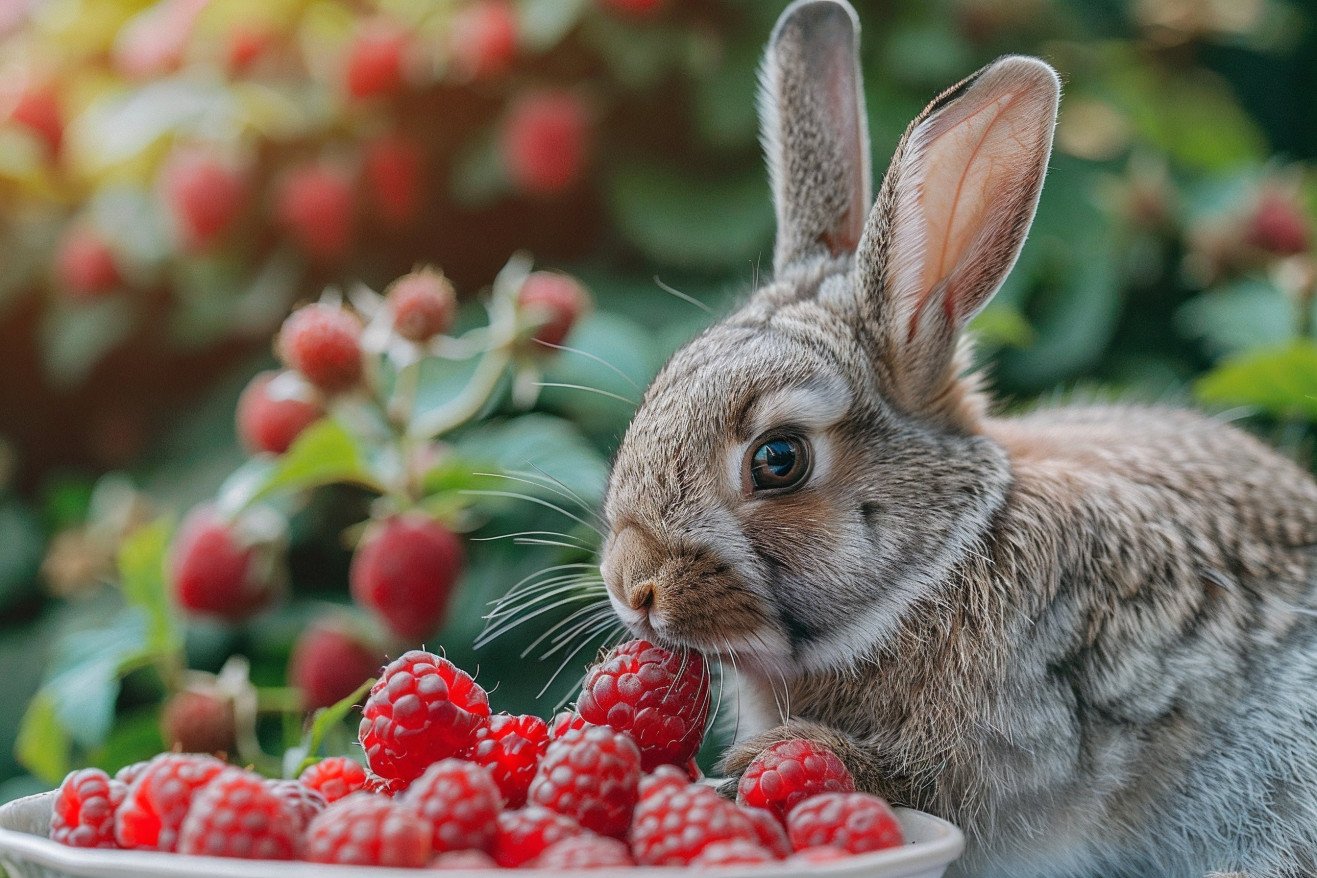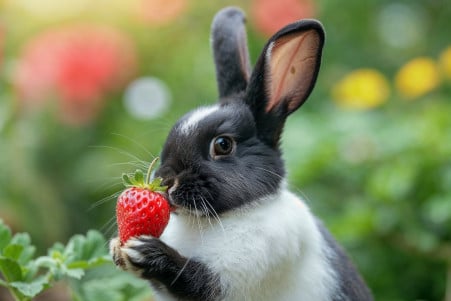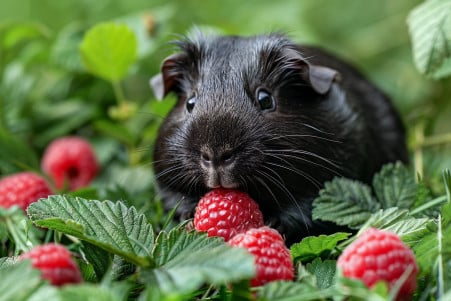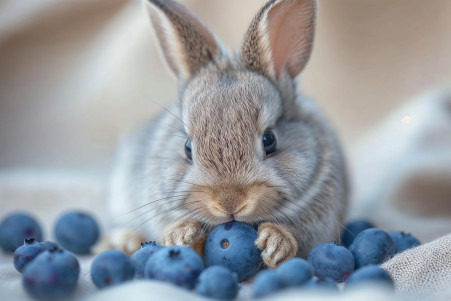Can Rabbits Eat Raspberries? A Guide to Safe Bunny Snacking
17 February 2024 • Updated 16 February 2024

Raspberries are a delicious fruit, but can you give them to your pet rabbit? Yes, rabbits can eat raspberries as part of a balanced diet. However, because of their sugar content, you should feed them in moderation, at a rate of 1–2 raspberries per 2 lbs of body weight, and no more than twice a week.
As with all new foods, make sure to introduce them slowly and keep an eye out for any digestive issues.
This in-depth article takes a deep dive into the nutritional research on rabbit diets and how fruits like raspberries impact their health. We’ve combed through veterinary advice, nutritional data, and scientific research on the diets of small animals to give you a full picture. With this knowledge, you can make sure to provide enough dietary fiber and other nutrients to keep your rabbit healthy while still giving them the treats they love.
Can rabbits eat raspberries?
Rabbit Nutrition Essentials: Fiber to Treats
A rabbit’s diet is one of the most important factors in its overall health, and the most important part of that diet is fiber. The Merck Veterinary Manual explains that the rabbit digestive system is designed to be fed a high-fiber diet, which is primarily made up of hay and grass. This is important because fiber helps with gastrointestinal motility, dental health, and nutrient absorption.
In the wild, rabbits are natural grazers, and they seek out foods that are good for them. However, in captivity, this can lead to obesity if their diet isn’t managed well.
Vet Partner explains that because rabbits are prone to gastrointestinal and dental issues, their diets should be low in sugar and starch.
Fruits, like raspberries, have natural sugars that can cause an imbalance in a rabbit’s gut if they are fed too much. However, treats like raspberries can be given in moderation because they also contain a variety of vitamins and antioxidants that can be good for rabbits.
It’s up to the rabbit’s owner to decide how much and how often to give their pet these treats to make sure they get the benefits without the risks, and to make sure that the treats stay a special part of the rabbit’s diet instead of becoming a problem.
Understanding the Nutritional Value of Raspberries for Rabbits
Both humans and rabbits enjoy raspberries for their sweet taste, but while humans can eat them in abundance, rabbits should only be given raspberries as an occasional treat. Raspberries are high in dietary fiber, vitamins, and minerals.
According to Medical News Today, a cup of raspberries contains an impressive 8 grams of fiber, which is important for maintaining a healthy digestive system. Raspberries are also high in vitamin C and manganese, both of which are important for rabbits when consumed in the right amounts.
That said, the sugar content in raspberries is something rabbit owners should be aware of. According to Healthline, a cup of raspberries contains about 5 grams of sugar. While this is fine for humans, rabbits have a lower tolerance for sugar, and too much can lead to obesity and digestive issues.
Raspberries are also high in antioxidants. The antioxidants in raspberries, including vitamin C and ellagic acid, help reduce oxidative stress, which can otherwise have a negative impact on a rabbit’s health.
The antioxidants in raspberries can provide additional health benefits to a rabbit’s diet, but they should be fed in moderation. While the vitamins and minerals in raspberries can be a valuable addition to a rabbit’s diet, it’s important to remember that they should only be given as an occasional treat to avoid the health problems that can come with feeding rabbits too much fruit.
Potential Risks of Feeding Your Rabbit Too Many Treats
While raspberries can be a tasty and nutritious treat for your rabbit, it’s important to remember that too much of a good thing can be bad. This is especially true when it comes to feeding your rabbit fruits. A high-sugar diet can lead to a number of health problems for small mammals, including weight gain and obesity, which can lead to diabetes, arthritis, and heart disease, according to Supreme Petfoods.
In fact, the Pet Food Manufacturers’ Association has found that 29% of small mammals suffer from these health issues, which is a major concern for pet rabbits.
In addition to the potential health risks associated with a high-sugar diet, feeding your rabbit too many fruits can also cause digestive issues. If your rabbit is eating too many fruits, you may notice changes in their appetite, the size and frequency of their droppings, and signs of discomfort.
According to Small Pet Select, while the natural sugars in fruits aren’t toxic, they can ferment in the gut and disrupt the balance of bacteria in the digestive system. This is why it’s so important to feed your rabbit treats in moderation.
Feeding your rabbit too many sugary treats can also lead to dental issues. When sugars are broken down in the body, they produce acids that can erode the enamel on your rabbit’s teeth, leading to dental disease and even gum disease.
This is why it’s important to pay close attention to your rabbit’s oral health when you introduce new treats like raspberries into their diet. By keeping an eye on your rabbit’s weight, eating habits, and the condition of their teeth, you can make sure that treats are a healthy part of their diet.
Just remember that treats should be given in moderation and make up only a small part of your rabbit’s diet, which should be based on hay and leafy greens.
How to Feed Your Rabbit Raspberries
Because of the potential for digestive upset, it’s important to introduce raspberries to your rabbit’s diet slowly. Start by giving your rabbit one raspberry and then monitor your pet for the next 24 hours. Petsolino recommends a tablespoon-sized serving, which is equivalent to a couple of raspberries, and says you should feed this treat no more than two to three times a week.
Make sure to buy fresh, organic raspberries to avoid pesticides. Fuzzy-Rabbit says store-bought raspberries should be washed thoroughly under cold water to remove any residues.
If you opt for frozen raspberries, which are a good source of vitamin C, make sure they are completely thawed before giving them to your rabbit to avoid stomach upset from the cold. Dried raspberries, which are high in sugar, can be given in small amounts as long as they don’t contain sulfites or preservatives.
If your rabbit experiences any digestive issues, such as soft stool or a change in appetite, after eating raspberries, stop giving them the treat and talk to your vet. USA Rabbit Breeders says it’s important to always watch for any changes in your rabbit’s health when you introduce new foods.
By paying close attention to your rabbit and making sure you give them fresh raspberries that are free of any additives, you can make sure they safely enjoy this treat.
How to Give Your Rabbit Raspberries
When it comes to giving your rabbit raspberries, the key is to do so in moderation. As the RSPCA notes, treats such as raspberries should be fed in small amounts and should be part of a diet that’s primarily made up of hay and fresh greens.
However, raspberries aren’t the only treats that rabbits can enjoy. Protexin Vet recommends giving rabbits a range of vegetables and herbs, such as basil, dandelion, and coriander, to ensure that they have a varied diet that doesn’t include too much sugar.
These treats can also be good for your rabbit’s gut health and can help keep them mentally stimulated.
In addition, treats can be used to help train and modify your rabbit’s behavior. Using treats to reward good behavior can help reinforce positive habits and make feeding time a fun and interactive experience. As Rabbit.org explains, small pieces of apple or herbs can be used as treats to help train your rabbit if they are used in moderation.
Of course, it’s important to make sure that your rabbit is getting a well-rounded diet. Treats should be used as an occasional supplement to your rabbit’s regular food. This way, you can make sure that your rabbit stays healthy and happy, and you can help ensure that you have a long and rewarding relationship with your pet.
So, give your rabbit raspberries and other treats in a way that’s both loving and responsible, and always make sure that you’re looking out for your bunny’s best interests.
In Conclusion: Can Rabbits Eat Raspberries?
In conclusion, raspberries can be a fun and tasty addition to your rabbit’s diet when given in moderation. It’s important to remember that rabbits need a diet that is high in fiber, and that treats like raspberries should be given in moderation because of their sugar content. Raspberries should never be used as a replacement for the fibrous foods like hay that rabbits need to eat the most.
We’ve also learned that it’s best to err on the side of caution and stick to the recommended serving size of 1–2 raspberries per 2 lbs of body weight, no more than twice a week. You should also pay close attention to how your rabbit reacts to these treats, as their health is the most important thing.
With this information in mind, we hope that you’ll continue to be a responsible pet owner and prioritize your rabbit’s dietary needs. This means introducing new foods and treats slowly, watching for signs of distress, and always making sure that your rabbit’s diet is well-balanced.
By offering your rabbit safe treats, you can strengthen your bond and provide them with some much-needed variety in their diet. We hope that the happiness you get from treating your pet will be as sweet as the raspberries they get to enjoy every once in a while, all while knowing that you’re taking care of their health and well-being with every treat you give them.


